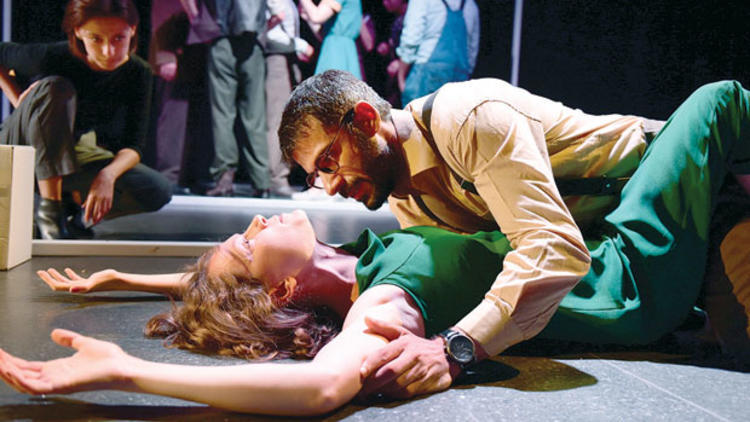Review: DOGVILLE at Glass Room, Uniq Istanbul

"And they asked me which heads should fall, and the harbour fell quiet as I answered 'All'."
Lars von Trier was struck by this great revenge motif and he decided to make a movie about revenge. But this was not going to be the only idea inspired by Brecht...
Versus Theatre has added the stage adaptation of the critically acclaimed movie, Dogville, to their 2018-2019 repertoire. The play has had its premiere recently and seems to have caught the attention of the theatre-goers.
Dogville is about this little town where nothing really happens. People of the town seem to live the same day over and over. However, one day something really strange happens. A girl named Grace arrives to town. She is on the run. The 'intellectual' of the town, Tom, decides that the township should help her and convinces the people to do so. In return of this great kindness, Grace offers them her help with their daily work. But will the help remains as help, or turn into duty? We use the term pure evil quite often we don't really use pure goodness, why is that? Is there such thing as pure goodness? Good is simple, evil is complicated; and what about the human intellect? Both the film and the play investigate these questions.
The apples in each house captured my attention as I took my seat, signaling that this particular production was going to delve into morals with an emphasis on religion. The religious orientation of this particular text is clearly Christianity but considering our country's stance in religion, and its effects in our morals and culture, that was a neat trick that also serves as an alienation effect.
The original text is edited and when I say edited, I mean nearly half of the source is gone. And some characters are omitted from this particular adaptation (Lauren Bacall wouldn't have approved) (sorry Vera's last scene, Patricia Clarkson wouldn't stand for this). These changes have made it possible for the audience to sit through the whole experience without intermission -considering this particular text, no intermission is definitely the right choice. But do these changes have their downsides? Yes. The cuts mean more for the narrator, less for the township and Grace. As a consequence there is less space left for the actors -to act. The film has a masterful balance between the narrator and the characters which made the alienation effect reach its highest potential.
As I have already mentioned the narrator, let me give more details about her. Yes, it's a her in this adaptation. Here, she is on stage with the actors, unlike in the film. And she is the person that separates this production from the film. Olcay Yusufoglu plays her similarly to Ozge Ozder's Feste in Serdar Bilis' Twelfth Night. Not only the way she acts but also how she serves the production as she, too, carries a hand camera that is projected at the wall.
Her portrayal is openly on Grace's side from the very beginning, unlike the narrator in the film. John Hurt (the narrator in the film) simply tells the story in an indifferent mood, and sometimes cynically which gives the audience the feeling that Grace really is all alone in that little town and she is at the mercy of the township, whereas here, as Olcay Yusufoglu's narrator is on stage and her sympathies openly lie with Grace, Grace's tragedy loses its impact a bit.
I'm not going to give more details about the narrator's part in the production as it's a spoiler for not only the ones that haven't seen the movie but also the ones that have seen it. However, it's a take that some will love and some won't. To me, it is something that simplifies the complexity of Lars von Trier's piece. I prefer it the way it is in the film: told as a tale, by someone above, and much more left to the audience. This production feels much more like an opinion on Lars von Trier's piece, and as I said before, some will love that, and some won't.
I have already mentioned the consequences of the cuts. They are, in a way, necessary, regarding the difference between cinematic experience and theatre experience, the audience's patience, and the necessity to make the play without an intermission but it's undeniable that a certain amount of tension is lost when more is given to the narrator and less to the township. However, there are some scenes that the director Kayhan Berkin has managed to build the tension in different ways. The scene where Vera smashes the seven porcelain figurines (which symbolize the seven deadly sins; as Grace starts to get them, evil creeps in her life) might be the most powerful scene of the whole production. He has created a cacophony: a mixture of laughs whilst Vera smashes the figurines, and then some sort of a hymn joining in as well.
Ece Cesmioglu leads with her first on stage part and I must say she has it. She is a fine texture if she finds the good tailor. She gives a major performance, especially in the second half of the play where the township gets harsher on her.
Overall, Versus Theatre's Dogville is a different interpretation of "the sad tale of the township of Dogville". I would have preferred to see an adaptation which had had split the audience into two: the ones that are satisfied by the ending, and the ones that are also distanced from Grace as well. This one leads the audience to a more certain path as the tale is not told objectively.
Reader Reviews

Videos

